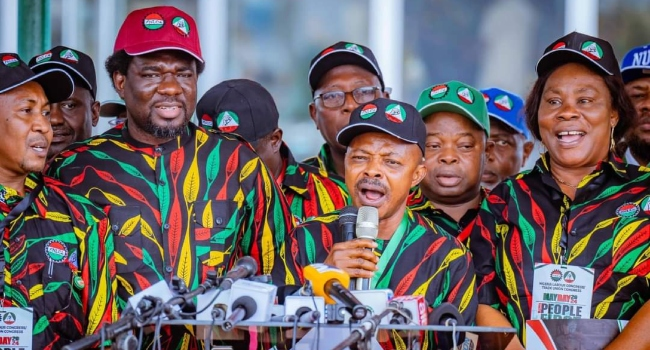Lamido Sanusi, the Governor of the Central Bank of Nigeria, is noticeably extroverted and loquacious. A public intellectual, the hell-raising technocrat would have been in his element in a university department of economics or a right-wing policy research centre where his managerialist and neoliberalist perspectives on the economy would have had full play. As the helmsman of the nation’s apex bank and lender of last resort, Sanusi comes across as frighteningly apolitical and stormy person, in a profession reputed for reticence and deadpan demeanour. His latest intervention, canvassing among others, a 50 per cent cut in the public sector workforce, a drastic pruning down of the legislature, the 36-state structure as well as the number of local government areas have had full play in the media.
In a vigorous reply to the acerbic criticisms, not to say uproar that trailed the publication of his opinion, Sanusi in a discussion with reporters in London argued that his views were sensationalised out of context but nonetheless went on to add that “the Central Bank is not a popularity contest. My job is to give frank and honest opinion as to where I think the economy should go”. Giving policy advice should of course take the form of a formal, or informal behind-the-door briefing to decision makers; the wisdom of giving advice on sensitive national topics on the pages of newspapers where they are in any case subject to trivialisation and the pressures imposed by headlines and deadlines remain extremely debatable. It is possible, however, that Sanusi was trying to raise a debate around matters which he had canvassed in policymaking circles, in which case he should have anticipated much of the spirited and hostile responses to his suggestions, especially from interest groups fingered in his dangling axe thesis. Apart from the extremely controversial dimension of sacking half of the nation’s civil servants, much of what Sanusi had to say concerning the urgency of prunning the political superstructure had been voiced at different times by others, including Prof. Pat Utomi, who tirelessly advocates part-time legislators, as well as Bola Tinubu, who recently called for a unicameral legislature to bring down the ever- rising tide of national expenditure.
These proposals are eminently sensible and should feed into the ongoing constitutional review process. It should be noted, however, that they do not exhaust the problems of our national prodigality and bonanza-spending which have assumed alarming dimensions under the Goodluck Jonathan administration, as illustrated by recent decisions to increase the presidential fleet of jets, as well as construct a banquet hall at the Villa costing N2.2bn. In contemplating the still-raging public storm that greeted Sanusi’s reform proposals, we encounter what this writer has elsewhere described as the ‘tragedy of reforms without reformers’ denoting a mindset which assumes that political leaders can manifest an opulence which will make American billionaires green with envy and yet call on the populace to tighten further their already tight belts beyond their survival margins. Querying Sanusi’s own moral credentials, for example, the National Assembly spokesperson, Victor Ogene, argues that not only has Sanusi jerked up the CBN workforce to 6,000 from 5,000, but that the CBN budget for last year is double that of the National Assembly. Cited, too is the IMF’s statement that for every N100 spent on services and projects in Nigeria, N80 ends up in the private pockets of corrupt officials and their cronies. In other words, Sanusi’s reformism, if it is a genuine one, should have commenced not just at the institution he oversees, but at the entire ensemble of governmental institutions, ethos and racketeering that increasingly define the current administration.
One can further illustrate the contradictory and superficial nature of Sanusi’s panacea with reference to the issue of workforce downsizing which he advocates. Initially downsizing was viewed globally as a quick-fix by distressed corporate and governmental organisations; a lower wage bill was expected to translate to a smarter institution more efficiently run and task-oriented. Study after study has shown, however, that the expected yields from downsizing, construed narrowly as job layoffs, hardly materialise. As one human resources expert once wittingly quipped, “Downsize, Rightsize and Capsize”. For example, a recent survey which appeared in the Wall Street Journal found out that of 1,000 United States firms which downsized, only 46 per cent had reduced expenditure; 32 per cent had a bulge in profit; 22 per cent had increases in productivity; and 22 per cent successfully reduced bureaucracy. Beyond these dismal statistics is the more disturbing fact that downsized organisations often went down with profound human resource ailments arising from survival syndrome and insecurity of those who were untouched by the exercise much less of the deleterious effects of throwing more workers into an economy already reeling from high unemployment. In the case of governmental institutions in Africa, retrenchment, as it is popularly called, is often followed by backdoor swelling of the workforce through several unmanned entry points and is hardly attended by reduction in running cost. Thus, what the right hand surrenders, the left hand retrieves by stealth.
In the same manner as management experts are increasingly emphasising corporate reinvention rather than downsizing, merely calling for a reduction of the workforce addresses only a tip of the iceberg of footloose spending that characterises the Nigerian government. More to the point is the urgency to challenge the way and manner in which governmental businesses are conducted which would include an investigation of the myriad loopholes through which funds meant for development are illegitimately diverted. Such a project which would be a genuine transformation agenda as opposed to an oratorical one will seek to change the ethos of windfall spending and ingrained indolent and unaccountable culture which facilitates the easy looting of the treasury by those at the top as well as the retooling of the workforce and supportive technologies. This, of course, would mean that those championing such reforms will manifest the sacrificial values which would convince the rest of the nation that they mean business. It is only in this context that piecemeal suggestions like reducing the admittedly bloated political superstructure will indeed make sense. Needless to say that initiating and sustaining that limited reform programme would require strong and disciplined leaders who can stay the course. Leaders who advocate one thing and do another are hardly candidates for any such political and economic transformation.
The furore and outburst at Sanusi’s suggestions, one suspects, constitute a referendum of sorts on an administration perennially calling for sacrifices from the hard-pressed citizenry but insists on maintaining for its own members a luxurious and insensitively affluent lifestyle. To sustain such prodigality, the administration, apart from increasing taxes and removing subsidies, has gone wildly aborrowing to the tune of 2.57tn in two years as The PUNCH revealed on Tuesday December 4, 2012. These are the real reasons one fears for the uproar against Sanusinomics.














Not Sanusi Again
http://lightblessforever.blogspot.com/2012/12/my-…